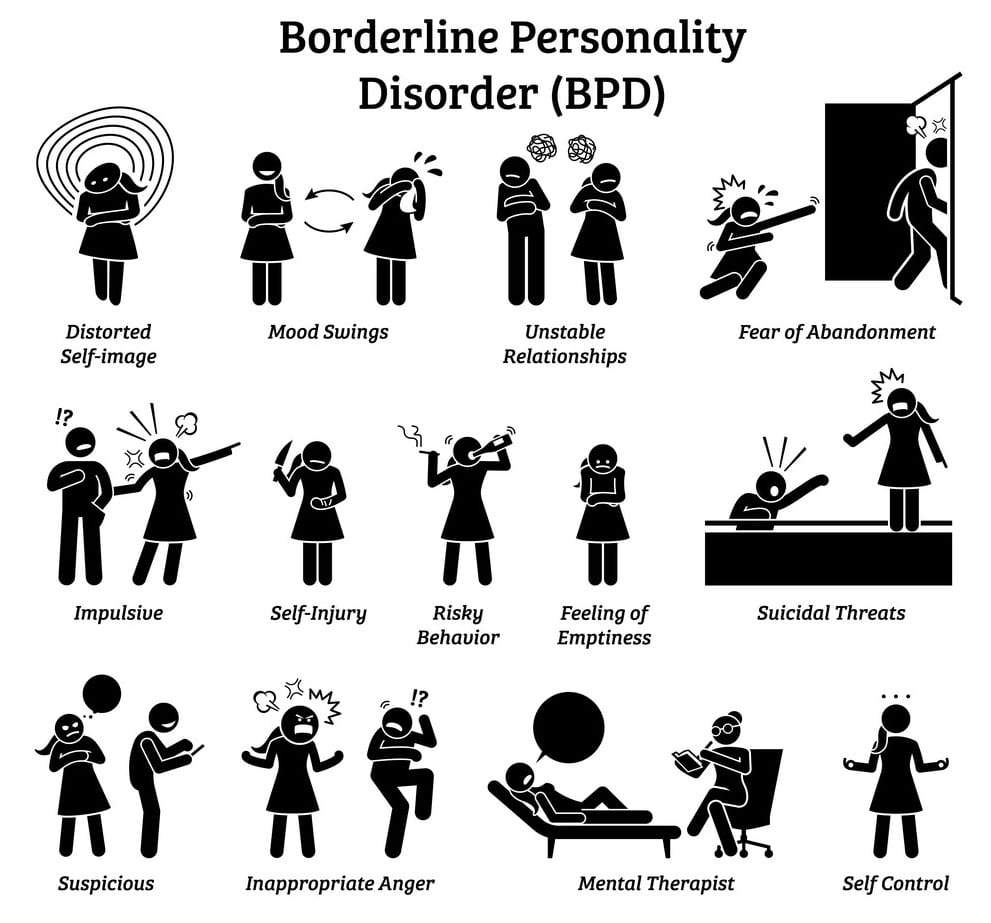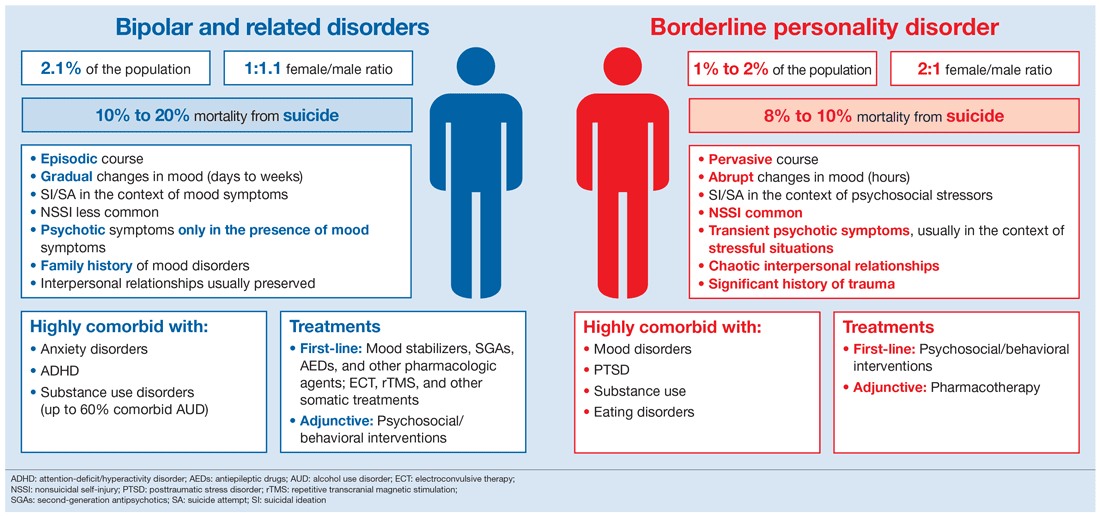BPD or Borderline Personality Disorder
Summary: BPD or Borderline Personality Disorder
Borderline Personality Disorder (BPD) is a mental health condition characterized by unstable moods, intense fear of abandonment, impulsive behavior, and difficulty maintaining healthy relationships. At Overland IOP in Los Angeles, we treat BPD through our Intensive Outpatient Program (IOP) and Partial Hospitalization Program (PHP) using evidence-based therapies including Dialectical Behavior Therapy (DBT), Cognitive Behavioral Therapy (CBT), and individual and group therapy sessions. Our programs are available in-person, online, and in hybrid formats, with morning, afternoon, and evening scheduling options.
Borderline Personality Disorder or BPD is a mental disorder characterized by unstable moods, behavior, and relationships. In the United States, recent research has shown that 1.6% of the population has BPD. That number may seem small, but when you consider just how large the United States is, you may realize that 1.6% represents quite a large number of people. BPD impacts the way people think and feel about themselves and others, causing problems functioning in everyday life. BPD might include self-image issues, difficulty managing emotions and behavior, and a pattern of unstable relationships.

People with borderline personality disorder (BPD) often have a strong fear of abandonment, struggle to maintain healthy relationships, have very intense emotions, act impulsively, and may even experience paranoia and dissociation. Borderline personality disorder can damage many areas of a patient’s life. It can negatively affect intimate relationships, jobs, school, social activities, and self-image, resulting in:
- Repeated job changes or losses
- Not completing an education
- Multiple legal issues, such as jail time
- Conflict-filled relationships, marital stress, or divorce
- Self-injury, such as cutting or burning, and frequent hospitalizations
- Involvement in abusive relationships
- Unplanned pregnancies, sexually transmitted infections, motor vehicle accidents, and physical fights due to impulsive and risky behavior
- Attempted or completed suicide
In addition, patients may have other mental health disorders, such as:
- Depression
- Alcoholism
- Anxiety
- Eating disorders
- Bipolar disorder
- Post-traumatic stress disorder (PTSD)
- Attention-deficit/hyperactivity disorder (ADHD)
- Other personality disorders
Symptoms of BPD
Borderline personality disorder affects how you feel about yourself, how you relate to others, and how you behave. Signs and symptoms may include:
- An intensive fear of abandonment. People with BPD are often terrified of being abandoned or left alone or rejected
- A pattern of unstable intense relationships. People with BPS are idealizing someone one moment and then suddenly believing the person doesn’t care enough or is cruel
- Unclear or shifting self-image
- Impulsive, self-destructive behaviors, often in response to the fear of rejection
- Impulsive and risky behavior, such as gambling, reckless driving, sex addiction, eating disorders or drug abuse, or sabotaging success by suddenly quitting a good job or ending the healthy relationship
- Wide emotional swings lasting from a few hours to a few days, which can include happiness, irritability, or anxiety
- Ongoing feelings of emptiness
- Inappropriate explosive anger. People with BPD are frequently losing their temper, being sarcastic or bitter, or having physical fights

BPD test
If you’re aware that you have any of the signs or symptoms above, talk to your doctor or a mental health provider.
What causes borderline personality disorder
The cause of borderline personality disorder isn’t well understood. Borderline personality disorder may be caused by:
- Genetics. BPD may be inherited or strongly associated with other mental health disorders among family members.
- Environmental factors
- History of child abuse
- Brain abnormalities
Diagnosis is made based on symptoms. Symptoms include emotional instability, feelings of worthlessness, insecurity, impulsivity, and impaired social relationships. Treatments include talk therapy or, in some cases, medications. Hospitalization helps if symptoms are severe. If left untreated, the effects of borderline personality can be devastating, not only for the individual who is diagnosed with the disorder, but their friends and family as well. Some of the most common effects of untreated BPD can include the following: Dysfunctional social relationships. Repeated job losses.
BPD vs Bipolar
BPD and Bipolar disorder are often confused. They both have symptoms of impulsiveness and mood swings. However, borderline personality disorder (BPD) and bipolar disorder are two separate disorders with different symptoms and treatments. Diagnosing a mental illness isn’t like diagnosing some physical illnesses—it takes a lot of observation and understanding to find the right diagnosis. It’s best to talk to your therapist for the right diagnosis. Both BPD and bipolar have good treatment options, but they are very different options, so putting time into getting a correct diagnosis is essential.

Frequently Asked Questions About (FAQ) About BPD or Borderline Personality Disorder
FAQ1: What is Borderline Personality Disorder (BPD)?
Borderline Personality Disorder (BPD) is a mental health condition that affects how a person thinks and feels about themselves and others, causing patterns of unstable relationships, intense emotional reactions, impulsive behavior, and a chronic fear of abandonment. BPD affects approximately 1.6% of the U.S. population and is treatable with evidence-based therapies such as DBT and CBT.
FAQ2: What are the symptoms of Borderline Personality Disorder?
Common symptoms of BPD include an intense fear of abandonment, unstable and intense relationships, unclear or shifting self-image, impulsive and self-destructive behaviors, extreme mood swings, chronic feelings of emptiness, and inappropriate or explosive anger. These symptoms can last from a few hours to several days and often interfere with work, school, and personal relationships.
FAQ3: How is BPD different from Bipolar Disorder?
While BPD and Bipolar Disorder share symptoms like mood swings and impulsivity, they are distinct conditions with different causes and treatments. BPD mood shifts are typically triggered by interpersonal events and last hours to days, while Bipolar mood episodes tend to last weeks to months and are more cyclical. An accurate diagnosis from a qualified mental health professional is essential because treatment approaches differ significantly.
FAQ4: How does Overland IOP treat Borderline Personality Disorder?
Overland IOP in Los Angeles treats Borderline Personality Disorder through structured Intensive Outpatient (IOP) and Partial Hospitalization (PHP) programs that include Dialectical Behavior Therapy (DBT), Cognitive Behavioral Therapy (CBT), individual therapy, group therapy, and medication management. Treatment plans are personalized and available in-person, virtually via telehealth, or in hybrid formats.
FAQ5: Can BPD be treated without residential or inpatient care?
Yes, many people with BPD achieve significant improvement through outpatient treatment. Intensive Outpatient Programs (IOP) and Partial Hospitalization Programs (PHP) provide structured, evidence-based therapy multiple days per week while allowing patients to maintain their daily responsibilities. Overland IOP in Los Angeles offers morning, afternoon, and evening program options to accommodate different schedules.
FAQ6: What causes Borderline Personality Disorder?
The exact cause of BPD is not fully understood, but research suggests it results from a combination of genetic factors, environmental influences such as childhood trauma or abuse, and brain abnormalities affecting emotional regulation. Having a family history of BPD or other mental health disorders may increase the risk of developing the condition.
FAQ7: Does Overland IOP accept insurance for BPD treatment?
Yes, Overland IOP in Los Angeles accepts most major insurance plans for BPD treatment, including Aetna, Cigna, UnitedHealthcare, Blue Cross Blue Shield of California, Kaiser, Optum, Tricare, and SAG-AFTRA. Same-day insurance verification and admissions are available by calling (800) 530-3100.

Overland IOP is a facility that demonstrates personalized care to every individual that arrives here, as every person is different and has unique requirements and objectives they want to meet. Our team, at Overland IOP, offers services that range from mental health counseling to rehabilitative services for various and complex addictions. Navigating the world of recovery and healing should not be a singular undertaking, especially when such beneficial resources such as ours exist and are here to help. With the new California mental health law, quality care and support have become significantly more accessible to those that are in urgent need of mental health aid, and Overland IOP is undoubtedly one of the best facilities in the state when it comes to providing these crucial services. Overland Intensive Outpatient is ready to provide both in-person and virtual care (Telehealth services). Help is only one call away! We work 24/7.
Published: April 01, 2021

Published: February 14, 2026
Medication-Assisted Treatment (MAT): How It Works?
Summary: Medication-assisted treatment (MAT) is an evidence-based approach to addiction treatment that combines FDA-approved medications with behavioral therapy and counseling to treat substance use disorders — primarily opioid and alcohol addiction. MAT is endorsed by the Substance Abuse and Mental Health Services Administration (SAMHSA), the National Institute on Drug Abuse (NIDA), and the World Health […]
Read more
Published: February 06, 2026
Talk Therapy: Types, Benefits & How It Works in California
Summary: Talk therapy — also known as psychotherapy — is a structured, evidence-based treatment approach in which a trained mental health professional helps individuals identify, understand, and change the thoughts, emotions, and behaviors that contribute to mental health conditions and substance use disorders. It is the foundation of treatment for depression, anxiety, PTSD, personality disorders, […]
Read more
Published: January 27, 2026
What Is DPD? Understanding Dependent Personality Disorder
Most people don’t ask, “What is DPD or Dependent Personality Disorder?” They come in feeling drained, anxious, and stuck in relationships that feel restrictive yet hard to leave. Being alone feels unsettling. Decision-making feels paralyzing. Reassurance becomes a daily necessity rather than a comfort. At Overland IOP in Los Angeles, we often see Dependent Personality […]
Read more
